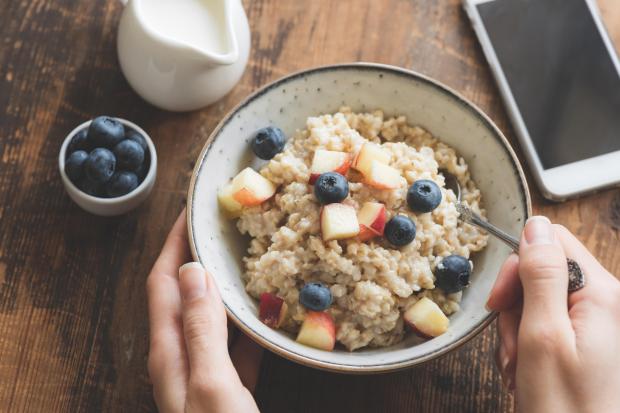How to get more fibre into your diet – from having porridge for breakfast and pasta for dinner
90 per cent of us aren't eating enough fibre. We reveal the most fibrous foods - and how much you'd have to chow down to reach those targets

90 PER CENT of us aren't eating enough fibre.
But it's actually really easy to get roughage into your every diet without having to guzzle down spoons of bran every day.
Fibre is so important to our everyday health.
It's the stuff that ensures we don't go too long without having a poo. It wards off things like heart attacks and stroke. It can improve cholesterol and blood sugar levels - crucial in preventing or managing diabetes.
Oh, and it also protects many of us from developing bowel cancer.
So it really is well worth making sure that you're getting the recommended daily amount. The government recommends you eat at least 30g a day. That's double the amount most people manage to eat.
Sun nutritionist Amanda Ursell told us: "Fibre is an essential nutrient and has been known for some time to be crucial for normal functioning of the gut and for good daily intakes to be related to a reduced risk of chronic problems like type 2 diabetes, heart disease and bowel cancer.
"We also know that some soluble fibres found in foods like oats, apples, pears and pulses like lentils, baked beans and peas help to both lower blood sugar and levels of ‘bad’ cholesterol.
"Getting up to the daily 30g target for adults however requires determination and most of us, a real overhaul of our usual day-to-day habits, switching for example to wholegrain breakfast cereals, wholemeal bread, brown pasta and rice and upping vegetables and fruit.
"This leaves little room for extras like puddings, cakes, biscuits and general processed foods."
Here's what to eat to make sure you're getting enough rough(age) in your life and how much you'd have to eat of them to meet the RDA:
1. Wholemeal bread - 15 slices
It's time to stop being scared of eating bread, because wholemeal bread contains a stack of heart-healthy fibre.
100g contains around 7g of roughage. Hovis Wholemeal contains 2g per slice, as well as vitamin B1 and protein (2.9g per slice).
2. Oats - 5 cups
Not only is porridge a really filling breakfast, but it also offers up a tonne of roughage.
Half a cup of rolled oats contains 5.7g of fibre.
3. Potato - 10 small potatoes
Jacket potatoes offer more fibre than two slices of wholemeal bread - and they're a super easy meal!
One small potato contains 3g of fibre, while a 175g serving of boiled new potatoes also gives you 11 per cent of your recommended daily allowance of fibre.
Boil them in the minimum amount of water possible or keep the skins on to retain as much of the vitamins as possible.
4. Wholegrain pasta - 3.6 cups
One cup of whole grain (brown) pasta contains 8.3g of fibre - more than double that of white pasta.
So if you love your penne, it's definitely worth making the swap.
5. Popcorn - 25 cups
If you want to up your fibre content while keeping an eye on calories, popcorn is probably the best snack out there.
Air-popped popcorn is very high in fibre and very low in calories (if you don't smother it in sugar and salt!).
You can buy packs of plain popcorn to microwave at home - perfect for snacking on at work or in front of the TV.
There are 1.2g of fibre per cup of air-popped popcorn.
6. Broccoli - 12 cups
Loads of veg is high in fibre, including carrots, beetroots, Brussel sprouts and broccoli.
Brocolli is also one of the most nutrient-dense foods on the planet, loaded with vitamin C, K, B, folate, iron, manganese and tonnes of antioxidants.
It's also got a good whack of protein - so it's something to load up on if you're a veggie.
Fibre-wise, it contains 2.4g per cup.
7. Berries - 3.8 cups
As well as being rich in cancer-busting antioxidants, fruits like raspberries, blackberries and strawberries are really high in fibre (thanks largely to the seeds).
They're quite expensive to buy fresh - at least in the winter - but you can buy them much cheaper in the frozen cabinets. A big bag of mixed berries costs around £2 from most supermarkets. Simply blitz them up with some milk and you've got a fibrous drink!
One cup of raspberries contains 8g of fibre.
8. Dark chocolate - 1.5 bars
Good news for all you chocolate lovers. Dark chocolate is not only mega-high in antioxidants and other nutrients, but it also has a pretty high fibre content too.
A 28g piece contains 3.1g of fibre.
Just make sure that you're going for chocolate with 85 per cent cocoa and above, because that'll have less added sugar and fat.
9. Almonds - 250g
Almonds are packed with vitamin E, manganese, magnesium and healthy fats. And, it turns out, loads of fibre too. They have the same amount as dark chocolate, gram for gram.
MORE ON DIET
10. Lentils and split peas - 3 cups
Hate lentils? Why not make a dhal to go alongside your curry tonight?
Lentils and split peas are mega nutrition-dense (7.9g per 100g) and can easily be boiled up into a delicious stew. Sounds boring but it really doesn't have to be.
We pay for your stories! Do you have a story for The Sun Online news team? Email us at [email protected] or call 0207 782 4368. You can WhatsApp us on 07810 791 502. We pay for videos too. Click here to upload yours












